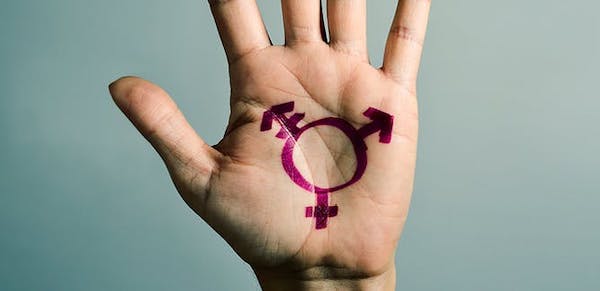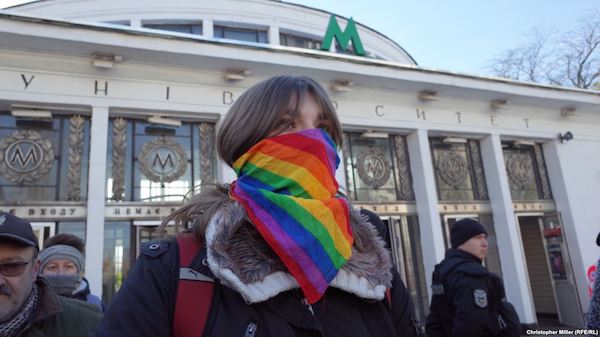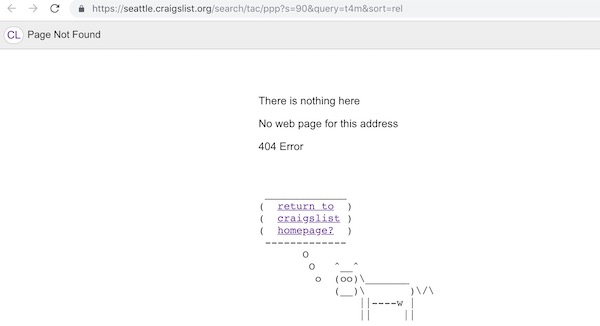With the Closure of the Craigslist T4M Section, The Trans Community Lost an Important Space for Connection

In early 2018, internet connections were drastically changed with the deletion of Backpage and revisions to Craigslist, two popular classified-ad webpages. Backpage was seized by the United States’ Federal Bureau of Investigation on April 6, 2018 Just a few days later, Craigslist responded by deleting their “Personals” section in an effort to avoid their own federal interference.
The reason for the federal seizure and Craigslist’s subsequent response was claims that the adult section helped facilitate human trafficking and prostitution. Additionally, the passing of the Stop Enabling Sex Traffickers (SESTA) and the Allow States and Victims to Fight Online Sex Trafficking (FOSTA) acts, which would make it easier to prosecute third-parties (like these online entities, for example) if they helped facilitate or support sex trafficking and/or prostitution. They would no longer be protected under the Communications Decency Act.
However, with the closure of these spaces, many people lost an important place to make consensual connections with one another in a low-risk, potentially anonymous environment. Consenting adults, of all genders and sexual orientations, used these spaces to explore their own sexuality and connect with other like-minded adults. Part of the community that particularly benefited from these online communities were trans people.
What is transgender?
Trans, or transgender, people identify as a different gender than that assigned to them, particularly biologically, at birth. The terms trans, trans-person, trans-woman, and trans-man are all commonly used and socially-acceptable. However, the terms transvestite, transsexual, or even transgendered are often seen as derogatory terms and should not be used.

Some trans people have had gender affirmation surgery, but many have not, simply because it is a costly and emotionally draining experience. Trans people are of all sexual orientations. There are roughly 700,000+ trans people living in the United States, according to the Williams Institute on Sexual Orientation and Gender Identity Law and Public Policy, housed in the UCLA School of Law.
Struggles within the Trans Community
Of the whole LGBT+ community, trans people are particularly stigmatized; in the United States, this is illustrated by ongoing efforts to pass “bathroom bill” legislation different states and the Trump administration’s efforts to redefine “gender” in a way that delegitimizes the trans experience and their existence. “Bathroom bill” legislation is attempts to legally mandate which public restroom a trans person can use. Additionally, there are other legal and systematic barriers for trans people, including getting their gender on their birth certificate or driver’s license changed, access to mental health professionals, access to hormone therapy, and the financial inaccessibility of gender affirmation surgery.
Furthermore, trans people experience violence like interpersonal and domestic violence, sexual assault, murder, and other physical attacks at a much higher rate than cisgender people and even other members of the LGBT+ community. These rates are even higher for trans people of color, particularly black women.
Finally, even smaller microaggressions, like refusing to use the appropriate pronouns or calling them by a degrading term, can have a large emotional impact on a trans person’s mental health. This community is also more likely to experience mental health concerns, including suicide ideation or attempts.
Unfortunately, due to many of these public and legal attacks against their identity and safety, trans people are sometimes scared to be honest about their identity and connect with others in public. That’s why online spaces are frequently so important to the queer community; it provides people a space to connect with one another in a safe and low-risk environment, before meeting together in person.
Making Connections within the Trans Community
Some trans people, however, are still using Craigslist to connect with one another. A quick glance at the “Missed Connections” section shows plenty of individuals using the “craigslist t4m”, "backpage alternatives" and similar tags. “T4M” stands for trans for men—meaning the individual posting is a trans person looking to connect with men. Similar tags include “m4t” (men for trans person), “w4t” (woman for trans person), and “t4w” (trans person for woman). Sample postings in the “Missed Connections” section read, “T4M Hollywood Hottie,” “You hopped in my Uber t4m,” and “T4m…you Came to my hotel.” Clearly the desire to connect with others in an online space is still needed by members of this community.

Thankfully, even with the “Missed Connections” sections, other websites and phone applications have emerged to try to provide safe spaces for connection for the trans community. While some spaces are free, others are paid, but they all seek to help the trans community engage with others in a low-risk environment. These spaces include:
- MyTransexualDate.com: This lesser known website is another trans-specific networking and dating website; however, this website is specific for t4m, or trans people looking for men, while other sites have a wider audience. This website also claims it is unique, as its staffed team is composed of (and for!) transwomen, making them uniquely positioned to provide useful and necessary services for the trans community.
- AdultFriendFinder.com: This internet-based, social networking site is meant to help consenting adults of all genders and sexual orientations find connections and other consenting adults. This site allows users to search for and connect with like-minded individuals by gender preference, sexual orientation, a particularly type of hookup (like cybersex or threesomes), and allows users to connect with others through forums, direct conversations or live, video chats.
- TSdates.com: This internet-based, social networking site is meant specifically for trans people to find friendship, romantic, and/or sexual connections with accepting and affirming individuals. Users may enter this website as guests or as a paid-members with unlimited access to the site’s benefits and privileges.
- Luckyapp.co: Just like Grinder or Tinder, the trans community has its own mobile app to help them find connections with other individuals. Lucky claims to be the #1 transgender dating app and it is available in both the Apple App Store and on Google play. Similar to other popular dating apps, Lucky uses the “swipe” method to help individuals in the same geographic area connect with one another.
- Tgpersonals.com: TGPersonals is another trans-specific webpage designed to help trans people connect with others that are looking for love, a hookup, or just other trans friends. This site also allows users to search by zip code and find those that are in their specific, local area.
Particularly in today’s political climate, it is increasingly more difficult for trans people to connect with one another in a safe and loving environment. Thankfully, these apps and websites are providing that safe space in a time when it is so desperately needed.









